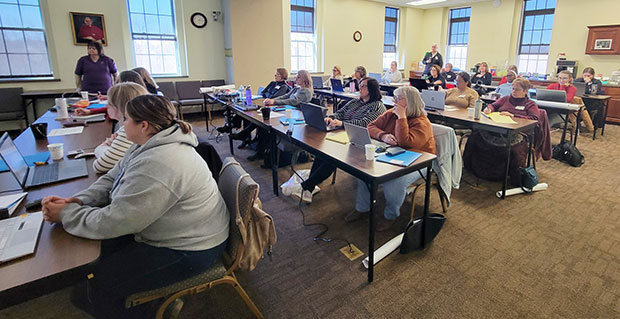
Staff from parishes across the Diocese of Davenport participate in a training session at St. Vincent Center in Davenport earlier this year.
By The Catholic Messenger
A diocesan-wide focus on welcoming and belonging inspired by Pope Francis’ call for a synodal Church led to a survey to assess the working relationship between chancery staff and the staffs of parishes and schools and volunteers. Diocesan Chief of Staff Deacon David Montgomery and Evangelization Director Patrick Schmadeke prepared a report on the survey results that they believe would be helpful to the faithful.
Among the 172 respondents of the survey conducted last fall were bookkeepers, deacons, and directors of religious education, office managers, parish choir members, parish council members, priests, pastors, school principals, secretaries, youth ministers, and volunteers.
Here is a synopsis of the findings:
At the heart of the survey was this statement: “When I reflect on my interactions with chancery staff, I feel like I am supported and appreciated.” Nearly 70% of the respondents agreed, with 33% strongly agreeing, 35% agreeing, 24% representing a mix of agreeing and disagreeing, 3% disagreeing and 5% strongly disagreeing.
Other survey questions included:
- In your personal experience, how is the balance of the relationship between chancery staff and parishes/schools?” On a scale of 1-5, with 1 being “more benefit to chancery staff” and 5 being “more benefit to parish/school,” 58% see an even balance: 1 (9%), 2 (16%), 3 (58%), 4 (11%), and 5 (5%).
- How much do you feel part of this wider community of the diocese?” On a scale of 1-5, with 1 being “not at all” and 5 being “very much so,” most feel a part of the diocese: 1 (7%), 2 (16%), 3 (28%), 4 (23.7%), and 5 (24.3%).
Chancery staff analyzed the 440 specific comments regarding ways to improve the working relationship with chancery staff. While the feedback was generally positive, there is always room for improvement, Deacon Montgomery and Schmadeke said. The chancery staff identified four main goals:
1) Rural parishes, especially western parishes, will feel as much a part of the diocese as anybody else. (Inclusion)
2) Chancery staff communication becomes more relational and less bureaucratic. (Communication)
3) Enhance familiarity with chancery staff and initiatives. (Information)
4) Balance the dynamic relationship between clergy and parish staff/volunteers and chancery staff. (Relationships)
Chancery staff identified specific barriers to these goals that respondents mentioned and action steps to reduce these barriers. Action steps undertaken or planned:
Inclusion
- Continue to hold diocesan events in eastern, central and western locations.
- When appropriate, continue to offer gatherings in-person and via Zoom at times convenient to the attendees.
Communication
- Encourage the feedback process for exchanging information to improve common understanding.
- Improve the timing and quality of responses to inquiries and requests from parishes and from chancery staff.
- Improve modes of communication, including the diocesan newsletter (Mini-Messenger), individual office newsletters, and the diocesan website.
Information
- Improve pathways to information according to recipients’ needs, including better navigation links within chancery sources (policy manuals, newsletters, chancery website).
- Consolidate requests for information.
Relationships
- Expand orientation event offerings for various groups, including new parish and school staff, newly ordained clergy and new pastors.
- Restart the annual parish support day for parish staff and clergy, focused on attendees’ needs.
- Continue to post profiles of chancery staff in The Catholic Messenger.
- Continue to form focus groups to analyze the ramifications of diocesan programs.
Deacon Montgomery, responding to a question from The Catholic Messenger, said, “The dichotomy between some of the responses to the survey is challenging. For example, some respondents are receiving too much and others too little information from the chancery staff. Responding to feedback is an important step in improving the relationship between the chancery staff and the people we serve.”
Schmadeke said he was glad to see “that, on the whole, leaders in parishes have a good working relationship with diocesan staff. There is work to be done, and we should focus on that work in intentional ways. We have a good base to build on.”
An ongoing process for receiving feedback and comments will be available soon through the diocesan website.











